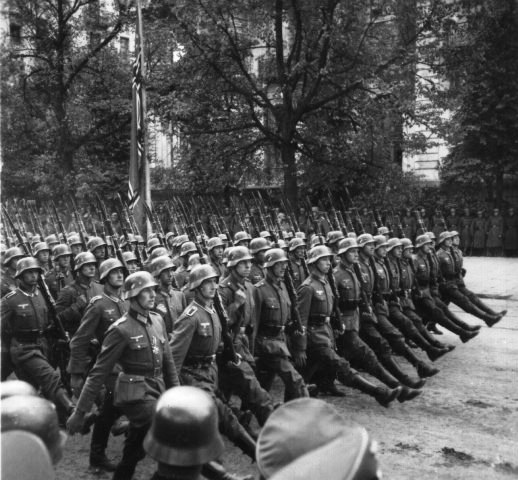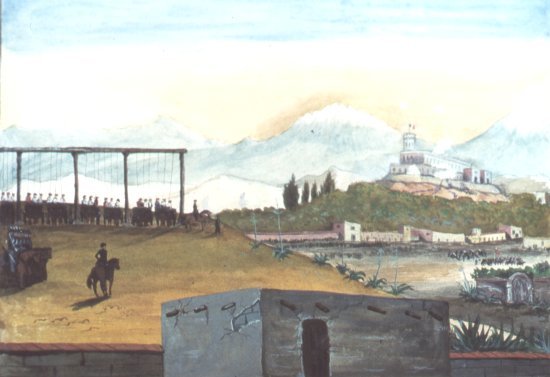 I received quite a post-bag on this one.
I received quite a post-bag on this one.Let me look at some of the questions raised.
Pedes Christi wrote:
”My question is, can such a government be considered legitimate? And if not, what is one justified in doing about it? I am not suggesting violent revolution (given your just war theory above), but how does one otherwise deal with such tyranny? I pray for the conversion of my country, but what else? With this I wrestle”.
I think you are right to wrestle with this issue. See what you think of my comments below.
Mark asks:
”Surely St. Thomas would not say that a private citizen should bear ‘any’ level of injustice imposed upon him, correct? To use an example from modernity, would a private citizen in say, the Soviet Union, China, Cuba or North Korea be justified in rebelling against the dictatorship?”.
He later asks:
”1. What relevance is it to the question of Just War when the subject is a private (Catholic) citizen rebelling against a non-Catholic government? Does it matter what form the government is (monarchy, democracy, communist, tyrant), or whether it is oppressive towards Catholicism, or Christianity in general? At what point does a secular government, tyrant or otherwise, become so oppressive to a Catholic society as to merit rebellion? I have in mind your response on 10 June at 14:51 and your comment s regarding the alleged Freemasonic affiliations of the European Prime Ministers.
2. In your reply to Ollie you offered that his view was that of a ‘tiny minority’; I wonder what relevance does this have? Did you mean that in terms of having any bearing on a contemporary public that it is not relevant because it is impractical, or because it was not widely held at the time, or only that it is so obscure as to be discarded for purposes of discussion?
3. As you have explained your understanding of the application of Just War principles to this particular conflict, I wonder whether you believe the Crusades to have been just? What about the First War of Independence by the Scots?
4. In your reply to Dion, you asked a (rhetorical?) question as to how he would conclude as to the guilt of a Mohammedan claiming justice as the motivation for a act which resulted in the death of innocents; I wonder if by this you mean to imply that combatants whose actions result in the death of other combatants in wars which you believe to have been unjust are guilty of murder? Or does the responsibility for the justice of the war rest solely on the civil authorities to whom God has granted this responsibility? Is his culpability greater because the innocents were his targets, as opposed to a combatant who knows there will be innocent lives loss by his actions but which are otherwise unintended?
5. I am curious if you know of any declarations since 1789 by Roman Pontiffs declaring a major conflict to have been unjust.”
 Was the German invasion of Poland just? Pomerania and Silesia were both originally German and had been seized after World War I. But the German government had pledged not to invade and, moreover, its ideology was then Nazi, a grossly heretical creed.
Was the German invasion of Poland just? Pomerania and Silesia were both originally German and had been seized after World War I. But the German government had pledged not to invade and, moreover, its ideology was then Nazi, a grossly heretical creed.
Let me essay an answer to these.
1. The principles of a just war are matters of Natural Law and, as such, apply to all men, not just Catholics. A private citizen, Catholic or otherwise, may not, according to those principles, rebel against properly constituted authority. It matters not what form the government takes, although it may be relevant that the government is oppressing Christianity, which is a true religion, rather than a false religion. However, that does not confer upon the private citizen the right to revolt against properly constituted government. Thus, at no point does a secular government, tyrant or otherwise, become so oppressive to a Catholic society as to merit rebellion, if it is a properly constituted government. Private citizens did not have the right to rebel against the Freemasonic European Prime Ministers, for instance, if they were properly constituted. There may be some residual or other powers of the Pope, however, to depose Catholic sovereigns but it would first have to be convincingly demonstrated that they derived their authority from the Pope. In general, according to Dante and St Thomas, Catholic monarchs derived their authority direct from God and not the Pope, although that varies. For instance, the Pope had the right to refuse to accept the Prince-electors nominee for Roman Emperor.
2. In my reply to Ollie I meant that his view is so obscure as to be discarded for purposes of discussion.
3. Not all of the Crusades were unjust – although they were not always justly conducted – because the Holy Land belonged to Christendom and the Eastern Empire in particular and it was a war of restoration and defence, expressly sanctioned by the Church as restorative and defensive against the ever-encroaching advance of Islam. I am not sure about the First War of Independence by the Scots. I would need to study the causes in more detail. Does anyone else have a view on it?
4. In my reply to Dion, I did not mean that combatants whose actions result in the death of other combatants in wars which are unjust are necessarily guilty of murder, although their leaders might be depending upon the usual criteria of intentionality. It is a standard application of the principle of “double effect” that a combatant who knows there will be innocent lives loss by his actions but which are otherwise unintended Is not guilty of moral crime. The culpability of the terrorist who deliberately targets the innocent is plainly evident. None of this was my primary point which was that no man can plead his disagreement with the Natural Law as an excuse for his crimes because every man has the Natural Law “written in his heart” and so cannot claim ignorance of it or exemption from it. If he could then Al Capone could say that he was innocent of murder because he did not believe that killing those who got in his way was murder.
5. There have been plenty of papal condemnations of conflicts as unjust since 1789. Pope Pius VI and Pius VII both declared the French Revolutionary wars unjust as well as the Bonapartist wars. Leo XII also did so and Gregory XVI declared the Italian revolutions unjust as did Bl Pius IX. He also condemned the Irish rebellions and excommunicated the Fenians on 12 January 1870. Of course, he also did the same to the Italian rebels. The Polish rebels were also – very significantly since they were rebelling against an heretic Tsar – condemned. The First World War was variously condemned and so were the Fascist and Nazi wars. The Spanish rebels were condemned (as were some actions by the Nationalists), Paul VI condemned the anti-terrorist war against ETA and John Paul II condemned the British invasion of the Falkland Islands, albeit not formally (and, in my view, on questionable grounds) as well as the Iraq war. St Thomas Aquinas, leading theologian of just war principles
St Thomas Aquinas, leading theologian of just war principles
St. Thomas would not say that a private citizen should bear ‘any’ level of injustice imposed upon him, however bad, because he expressly allows the principle of self-defence. One may defend oneself, one’s family and others, together with property. If this requires what may become a war against the government then that is justified on the principle of “double effect” provided that there is no intention to overthrow the government or to prosecute a war against it.
If, however, the government was never a legitimate one then a war might be prosecuted against it (subject to all the usual just war criteria) in order to restore the legitimate government.
This was the purpose behind the Jacobite and Carlist wars and – arguably – the US War between the States. The South were seeking to restore the original Constitution as against the effectively new and unauthorised Constitution imposed by Lincoln and the Northern Yankees.
The governments of the Soviet Union, China, Cuba and North Korea were all illegitimate governments imposed by revolution and force of arms against legitimate governments. So long as they continued to be illegitimate in that sense it would be open to anyone (subject to all the other just war criteria) to rise up against them to restore the true and legitimate government (if there was one).
"Manifest Destiny" was just a re-run of the old Puritan and Cromwellian cry that the Protestant white man was pre-destined by an apparently arbitrary God to rule over all other men as a "chosen people" of Biblical stature who would be enriched in a new republic designed chiefly for their benefit. It is, of course, unbiblical nonsense.
I agree that “Manifest Destiny” is really an outgrowth of the theology of certain Protestant groups (often Calvinists) who beleive in the “God is on our (America's) side” school of thinking and I agree that this theology – like that of the Cromwellian Puritans and the Afrikaner Boer Vortrekker people – tends to give the impression of a status of “chosen people” based upon the nation of Israel as a chosen people.
That is one of the reasons why I am opposed to such Americanist Yankee nonsense. It does no good to America nor to the rest of the world.
But you cannot persuade Americanists of this view. They simply stick their fingers in their ears and shout pro-Americanist slogans.
...

















.jpg)


























_-002.jpg/220px-Circle_of_Anton_Raphael_Mengs,_Henry_Benedict_Maria_Clement_Stuart,_Cardinal_York_(ca_1750)_-002.jpg)


